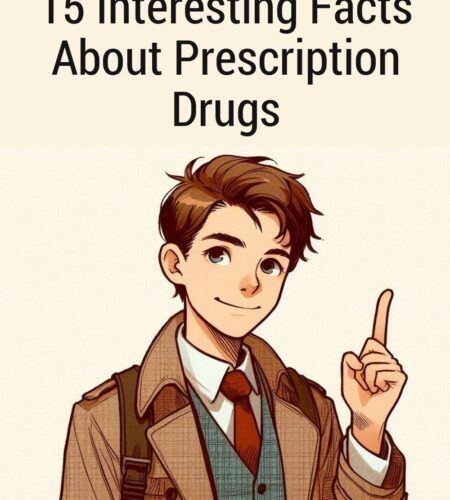Introduction:
Prescription drugs have become an integral part of modern healthcare and are used to treat a vast array of conditions, from fever to cancer. Everyone who takes prescription drugs needs to be aware of their potential side effects and how they interact with other drugs. While there is a lot of information to know about how these drugs work, here are 15 interesting facts about prescription drugs that will help you become more informed.
Fact 1: Prescription Drugs are Highly Regulated
Prescription drugs are heavily regulated by the Food and Drug Administration (FDA) to ensure that they are safe and effective for use. To be approved for sale on the market, drugs must undergo strict testing, and the FDA must be satisfied with the results. The FDA also inspects manufacturing plants to ensure that drugs are made in clean and sanitary environments.
Fact 2: Some Prescription Drugs Have Been Around for Decades
Prescription drugs can come and go, but some of the most commonly prescribed drugs have been around for decades. For example, aspirin has been used to treat pain and inflammation since the 1800s, and tetracycline antibiotics have been used to treat bacterial infections since the 1950s.
Fact 3: Generics are Everywhere
When it comes to prescription drugs, generics are just as common as name-brand drugs. In fact, according to the FDA, around 80% of prescription drugs in the U.S. are generics. Generic drugs are often just as effective as name-brand drugs, and they usually cost much less.
Fact 4: Not All(CAN BE ANY OTHER WORD) Generics are the Same
Not all generic drugs are the same. While some generic drugs use the same active ingredient as the name-brand drug, others may use different inactive ingredients or formulations. Therefore, it’s important to talk to your doctor before switching to a generic drug.
Fact 5: Prescription Drugs Expire
Prescription drugs have a limited shelf life, and they typically expire a couple of years after they are bought. It’s important to check the expiration date on your prescription, and make sure to discard any expired drugs.
Fact 6: Prescription Drugs Can Affect Your Health
Prescription drugs can have a significant effect on your health, both good and bad. While some medications can treat serious conditions, others can cause dangerous side effects or drug interactions. Make sure you talk to your doctor about the potential risks of any medication before taking it.
Fact 7: The Prices of Prescription Drugs Vary Widely
The cost of prescription drugs can vary widely, depending on many factors such as the form of the drug and your insurance coverage. Studies have shown that some name-brand drugs can cost five times more than generic alternatives.
Fact 8: Generic Drugs are Not Always Cheaper
Contrary to popular belief, generic drugs are not always cheaper than name-brand drugs. This is because generic drugs are made with the same active ingredients, but they don’t always use the same inactive ingredients or formulations. As a result, generic drugs can be as expensive as name-brand drugs.
Fact 9: Not All Prescription Drugs are FDA Approved
Not all prescription drugs are approved by the FDA. In some cases, drugs are available without FDA approval due to a process called “compassionate use”. Through this process, a limited number of people may access certain drugs that aren’t yet approved by the FDA.
Fact 10: Prescription Drugs May Treat Unrelated Conditions
Prescription drugs are often designed to treat a specific condition, but they may also be used to treat unrelated conditions. For example, the antibiotic tetracycline is used to treat bacterial infections, but it is also used to treat acne.
Fact 11: Some Drugs Are Addictive
Some prescription drugs, such as opioids and benzodiazepines, can be highly addictive. Because of this, doctors are increasingly cautious about prescribing these drugs, and they often use the lowest effective dose.
Fact 12: Prescription Drugs Can Interact With Other Drugs
Prescription drugs can interact with other drugs, both prescription and over-the-counter, so it’s important to check with your doctor before taking any medications together. For example, taking an antidepressant with a pain medication can increase the risk of side effects.
Fact 13: Some Drugs Have Strange Names
Many prescription drugs have strange or hard to pronounce names, such as doxazosin, amitriptyline, and oxycodone. It’s important to take note of the proper spelling and pronunciation of your medication to ensure that it is dispensed correctly.
Fact 14: Not All Prescription Drugs are Available Over the Counter
Some prescription drugs, such as opioids and benzodiazepines, are not available over the counter and must be prescribed by a doctor. These drugs have the potential to be abused, so it is important to take them only as your doctor has prescribed.
Fact 15: Some Drugs are Taken Long Term
Some prescription drugs must be taken for long periods of time, such as blood pressure medications or anti-seizure medicines. To ensure that these medications continue to work as intended, it’s important to take them as prescribed and discuss any changes or problems with your doctor.
Conclusion
Prescription drugs can be complicated and require a lot of knowledge to safely use. But the 15 interesting facts about prescription drugs discussed here can help you become more informed and help you make more informed decisions about the medications you take.
Subscribe to our email newsletter to get the latest posts delivered right to your email.



Comments